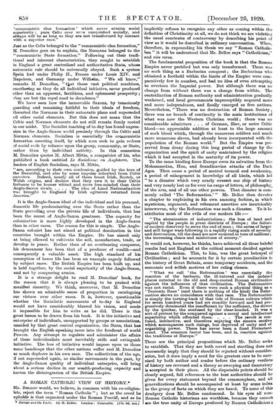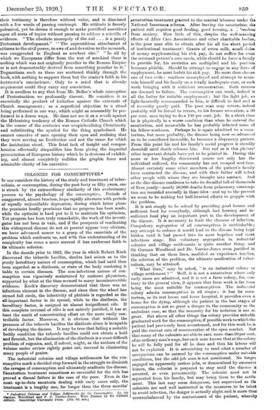A ROMAN CATHOLIC VIEW OF HISTORY.* MR. Bers.00 would, we
believe, in common with his co-religion- lets, reject the term "Roman Catholic " ; but as-the creed he upholds is that organized under the Roman Pontiff, and as be
• Europe and the Pada. Br H. Bettor. London; Constable. 1178. 6d. need
implicitly refuses to recognize any other as coming within the definition of Christianity at all, we do not think we are violating the usual courtesies of controversy by describing his point of view as it would be described in ordinary conversation. When, therefore, in expounding his thesis we say " Roman Catholic- ism " it will be understood that Mr. Belles says " Catholicism," and vice versa.
The fundamental proposition of the book is that the Roman Empire never perished but was only transformed. There was no such thing as a Barbarian conquest ; the Barbarians who obtained a foothold within the limits of the Empire were com- paratively few in number, and bad no idea of even attempting to overturn the Imperial power. But although there was no change from without there was a change from within. The centralization of Roman authority and administration gradually weakened, and local governments imperceptibly acquired more and more independence, and finally emerged as free nations. Nevertheless, " There was no destruction of Roman Society ; there was no breach of continuity in the main institutions of what was now the Western Christian world ; there was no considerable admixture . . . of German, Slav, or outer Celtic blood—no appreciable addition at least to the large amount of such blood which, through the numerous soldiers and much more numerous slaves, had already been incorporated with the population of the Roman world." But the Empire was pre- served from decay during this long period of change by the organization and the spirit of unity maintained by the religion whioh it bad accepted in the maturity of its power.
To the same binding force Europe owes its salvation from the Mohammedan, Hun, and Scandinavian attacks of the Dark Ages. Then came a period of mental turmoil and awakening, a period of enlargement in knowledge of all kinds, which led " to a disaster which very nearly overact our ship of history and very nearly lost us for ever its cargo of letters, of philosophy, of the arts, and of all our other powers. That disaster is com- monly called ' The Reformation.' " Mr. Belles then devotes a chapter to explaining in his own amazing fashion, in which mysticism, argument, and vehement assertion are inextricably interwoven, why the Reformation was such a disaster. To it he attributes most of the evils of our modern life :— " The abomination of industrialism ; the loss of land and capital by the people in great districts of Europe ; the failure of modern discovery to serve the end of man ; the series of larger and still larger wars following in a rapidly rising scale of severity and destruction, till the dead are now counted in tens of millions ; the increasing chaos and misfortune of society."
It would not, however, he thinks, have achieved all these baleful results had not England at the critical moment decided against Roman Catholicism. This, to him, was the great betrayal of Civilization ; and he accounts for it by certain peculiarities in the history of Great Britain, some temporary accidents, and the economic and selfish motives of her ruling classes.
" What we call the Reformation' was essentially the reaction of the barbaric, the ill-tutored and the isolated places external to the old and deep-rooted Roman civilization against the influences of that civilization. The Reformation was not racial. Even if there were such a physical thing as a Teutonic Race' (and there is nothing of the kind) the Refor- mation shows no coincidence with that race. The Reformation is simply the turning-back of that tide of Roman culture which for seven hundred years had set steadily forward and had pro- gressively dominated the insufficient by the sufficient, the slower by the quicker, the confused by the clear-headed. It was a sort of protest by the conquered against a moral and intellectual superiority which offended them. . . . The revolt is con- fused, instinctive, and therefore enjoying the sincere motive which accompanies such risings, but deprived of unity and of organizing power. There has never been a fixed Protestant creed. The common factor has been, and is, reaction against the traditions at Europe."
These are the principal propositions which Mr. Belloc seeks to establish. That they are both novel and startling does not necessarily imply that they should be rejeoted without consider- ation, but it does imply a need for the greatest care to be exer- cised by both author and reader before the ordinary verdicts of history are reversed and a theory so sweeping and damnatory is accepted in their place. All the disputable points should bo closely argued, full references to the best authorities should be 'given for every statement beyond the commonplace, and all generalizations should be accompanied at least by some index to the group of facts on which they are based. To none of this drudgery does Mr. Belles condescend. In his eyes all non- Roman Catholic, historians are worthless, because they cannot see the into unity of Europe produced by Roman Catholicism t
their testimony is therefore without value, and is dismissed with a few words of passing contempt. His attitude is fiercely polemical, yet he deems it enough to make pontifical assertions upon all sorts of topics without pausing to adduce a scintilla of evidence. "The absolute monopoly of the soil . . . is a purely Protestant development." " The superstitious attachment of citizens to the civil power, to awe of and devotion to the monarch, was exaggerated in England as nowhere else." " In all by which we Europeans differ from the rest of mankind there is nothing which was not originally peculiar to the Roman Empire or is not demonstrably derived from something peculiar to it." Dogmatism such as these arc scattered thickly through the book, with nothing to support them but the reader's faith in his Instructor's omniscience: Only to a mind that is already acquiescent could they carry any conviction.
It is needless to say that from Mr. Bean's whole conception of Protestantism we profoundly dissent. He considers it as essentially the product of irritation against the externals of Church management ; as a superficial objection to a ritual being performed in one way, which might as reasonably be per- formed in a dozen ways. Ho does not see it as a revolt against the Hebraizing tendency of the Roman Catholic Church which in the course of the centuries was unspiritualizing Christianity and substituting the symbol for the thing symbolized. He cannot conceive of men opening their eyes and realizing that they were serving an Institution and not the oause for which the institution stood. This fatal lack of insight and compre- hension effectually disqualifies him from giving the impartial presentation of European history which he is desirous of exhibit- ing, and almost completely nullifies the graphic force and admirable clarity of his narrative.



































 Previous page
Previous page